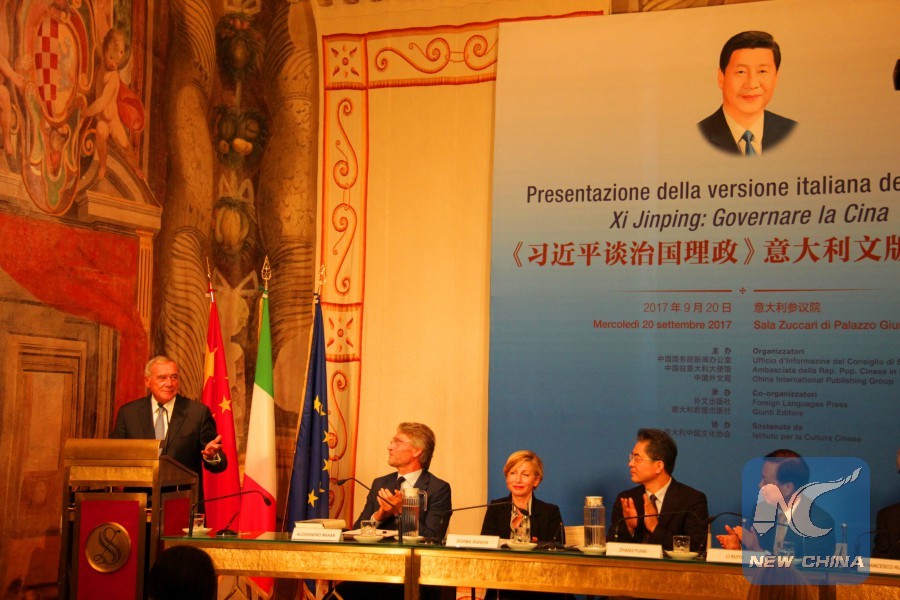Italian edition of President Xi’s book strikes a chord in Rome
|
Senate Speaker Pietro Grasso is speaking at the Italian Senate on Wednesday when the Italian edition of Xi Jinping: The Governance of China was presented.(Xinhua) ROME, Sept. 21 (Xinhua) — Italian leaders hailed Chinese President Xi Jinping’s view that development must be conducted in a “peaceful, civilized and harmonious way,” calling it the foundation for global development as the Italian edition of Xi Jinping: The Governance of China was presented at the Italian Senate on Wednesday. The 566-page book contains excerpts from 79 speeches, talks and interviews by Xi, along with a rich assortment of photographs. Senate Speaker Pietro Grasso praised Xi’s vision based on “reforms, sustainable development and fighting corruption.” “I was particularly struck by the deep and thoughtful historical perspective and the attitude of trust in the future,” Grasso said of Xi’s book. “In a globalized world, as Xi says in his book, development must be carried out in a peaceful, civilized and harmonious way. As Xi says, without peace neither China nor the world can develop successfully,” he added. This is a view shared by Italy and spelled out in its constitution and its trust in supranational institutions, beginning with theUnited Nations, where countries must commit to finding peaceful resolutions to international controversies, Grasso said. A former anti-mafia magistrate, Grasso recalled his visit to China in December 2015, when he spoke at the Party School of the Communist Party of China Central Committee in Beijing about the rule of law and an independent judiciary. Talking about the Chinese president’s view that development and economic growth must go hand in hand with environmental protection for the sake of future generations, Grasso pointed out that the environment and food security are two main sectors of Italy-China cooperation. The speaker also praised the Belt and Road Initiative proposed by Xi in 2013 for closer trade and infrastructure links between Asia, Europe and Africa, saying the future of Italy-China relations is closely intertwined with the new Silk Road. Cultural Heritage and Tourism Undersecretary Dorina Bianchi, a frequent traveler to China, said “the Chinese people know how to give their friendship and I think the bonds of friendship are the best guarantee of joint projects and bilateral cooperation.” The Belt and Road initiative is of strategic importance for Italy, and cultural cooperation is a part of the growing trade and economic synergy between the two countries, the undersecretary said. She also praised joint initiatives such as the Chinese-Italian police patrols in key tourist cities like Rome and Florence to make Chinese visitors more comfortable. “The Chinese people love our cultural treasures, our fashion, they admire our designers, our lifestyle, and all that is made in Italy,” Bianchi said, noting that some 1.4 million Chinese visit Italy every year. In 2016 alone, five million Chinese visited Europe. “We are proud to be a destination for millions of Chinese tourists,” the undersecretary said, adding that the Culture Ministry is working with the Chinese government to improve reception of Chinese tourists through a project called Welcome Chinese. Francesco Rutelli, who coordinates the Italy-China Cultural Forum, said that under Xi’s leadership China has seen “a real turning point” in its relations with Italy, which is the third largest recipient of Chinese investments in Europe. Rutelli, a former minister of culture and ex-mayor of Rome, said Italy-China diplomatic relations will celebrate their 50th anniversary in 2020 and there were rich opportunities to be garnered. “China’s international role is changing rapidly,” Rutelli noted. “China has taken a stand in defence of the positive aspects of globalization, and it is being called to take on new responsibilities,” Rutelli said. This new openness and responsibility on the global stage is mirrored in cultural openness and cooperation, Rutelli said, citing the example that 20 new opera theaters in China in recent years where Italian operas are performed. The two countries are working on new avenues for cultural cooperation, such as twinning their UNESCO World Heritage sites and setting up film co-productions, said Rutelli, who also heads the Italian Film Industry Association. Xi Jinping: The Governance of China was published in Chinese, English, French, Russian, Arabic, Spanish, Portuguese, German and Japanese in September 2014. Since then, over 6 million copies in more than 20 languages have been distributed in more than 160 countries and regions. |













